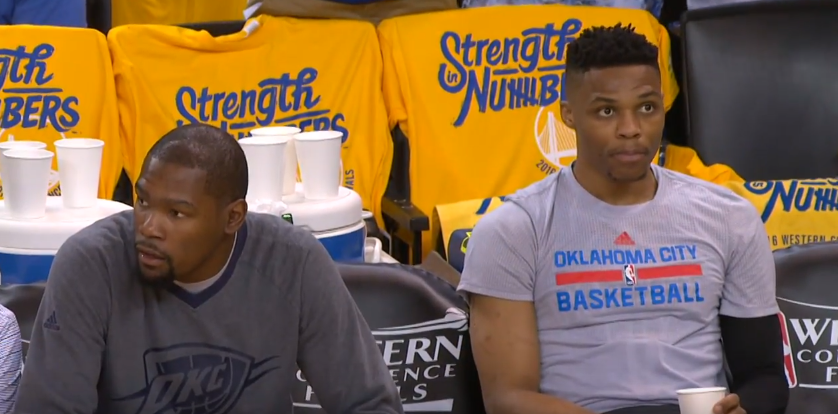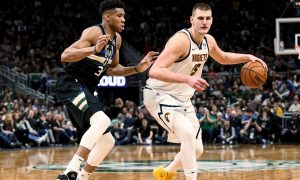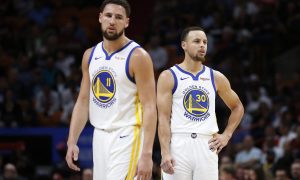To kick things off I’m going to make a statement, and it directly relates to a statement that I, and many others, made in 2012 after the Oklahoma City Thunder came back from an 0-2 deficit against the San Antonio Spurs in the Western Conference Finals. In 2012 this statement read a little bit differently than it does currently considering everything between 2012 and Monday, July 4th is now technically a part of the past. So here goes: The Oklahoma City Thunder should have owned the NBA in the 2010’s.
In 2012, the present-tense version of this statement that would have been forecasting the future would have read, “The Oklahoma City Thunder are going to own the NBA in the 2010’s” and if you made a statement similar to that one it would have hardly seemed like you were going out on a limb. It was a formality, a foregone conclusion that the next half decade or so would belong to a young core that had been built organically through a series of home run draft selections. Their timeline was accelerated and their championship window seemingly was more than just “open” … it was like the window had been cleared out completely. It was open air. The Thunder’s window wasn’t going to close for the foreseeable future; it was so open that, hypothetically, if someone from the future had come back to 2012 and told me that the Thunder would win the next five NBA Titles I would have been inclined to believe them. At least more so than I would have if he told me that Oklahoma City wouldn’t make another NBA Finals in the next five seasons.
Though it’s not a “what if” in the most traditional sense of the phrase, the success (or lack there of, depending on your perspective) of the Oklahoma City Thunder, formerly the Seattle SuperSonics, from 2007 to 2016 will forever be wondered about and debated. To varying degrees, the Thunder struck gold with four draft picks from 2007 to 2009. With the 2nd pick in 2007 they drafted Durant, the equivalent of winning the Powerball. In 2008, this time with the 4th pick, OKC drafted Russell Westbrook, which is the equivalent of winning the Powerball one fucking year after winning it the first time. In addition to those two, Oklahoma City stole Serge Ibaka late in the 1st Round in 2008 and landed James Harden with the 3rd pick in 2009. And just nine months after the Thunder drafted Harden they won 50 games. The maturation process wasn’t supposed to be that quick. Even though they were the 8th seed in the 2010 Playoffs, the Thunder win total improved by 27 in a year, which, without taking any time to really research, I’m willing to claim has to be among the largest in NBA history by a team that didn’t make a splashy move in free agency. There’s that accelerated timeline I told y’all about.
The Thunder were bounced from Round 1 in 2010 by the eventual NBA Champion Los Angeles Lakers. In 2011 they got beat by the eventual NBA Champion Dallas Mavericks in the Western Conference Finals. In 2012 they lost in the NBA Finals against the Miami Heat. They never got back to the Finals again. It’s hard to fathom that this is the case. Teams that are consistently one of the three or four favorites to win the NBA title don’t usually max out as a one time runner-up. Need some proof? Over the last twenty-five years these are the teams that have won at least 65 percent of their games (that, in an 82 game season, is representative of a 55-win season) in at least a seven season stretch, which shows a certain amount of longevity that comes with being a consistent contender for the Larry O’Brien Trophy:
- San Antonio Spurs (The entire 2000’s are in play)
- Los Angeles Lakers (They two different stretches of at least seven consecutive seasons where their win percentage was at least .650 … one in the Shaq/Kobe era, and one in the Kobe/Pau era)
- Chicago Bulls (The entire 1990’s are in play)
- Detroit Pistons (They qualify in the 2002-2008 range)
- Dallas Mavericks (It’s a ten-year stretch that extends from the tail end of the Dirk/Nash era to the season following the Mavericks 2011 Championship)
- Utah Jazz (From the mid 1990’s until the early 2000’s)
- Oklahoma City Thunder (From 2010 through 2016)
- Seattle SuperSonics (From 1994 through 2001)
Ironically, the Thunder and the Sonics are the only two teams on that list that appeared in only one NBA Finals in any respective stretch of at least seven years. Perhaps it’s karma because Clay Bennett stole the franchise from the city of Seattle, or maybe the best way to put it is this is the biggest stroke of bad luck in NBA history. But even then, bad luck doesn’t fully explain it. This represents a major historical anomaly and serves as a cautionary tale for teams that feel like they have a forever open championship window. A team that employs four of the top 50 players in the league (as the Thunder did in 2012 with Durant, Westbrook, Harden and Ibaka) or in the post-Harden Trade world, three of the top 50 players and two of the five best players in the world, is supposed to make more than one NBA Finals appearance.
This is the part that is hard to understand. I’m not a Thunder fan, nor am I a detractor, though I suppose I’ve cheered against them more than I have for them. I deeply enjoy the on-court work of Russell Westbrook, yet Kevin Durant has rubbed me the wrong way basically since the Sonics became the Thunder. All in all, I don’t really have any skin in the game. That’s why I find it odd that over the course of the previous 48 hours, I’ve spent more time thinking more about what the Thunder seemingly had more than what the Warriors have now.
In 2012, when OKC broke through in the Western Conference Finals, we knew they had the best young core in the NBA. It was a nearly indisputable fact. Even after Miami beat them in the Finals we as a collective basketball-consuming audience felt like the Thunder were better positioned for the future. Their four best players were under 25 years old. Kevin Durant was Tracy McGrady‘s best case scenario; an ultra-gifted scorer that was turning into arguably the best player in the NBA more rapidly than we expected. Russell Westbrook was a mold of clay that we knew would be shaped into either the league’s most dynamic point guard or the heir apparent to Kobe in terms of night-to-night cutthroat competitiveness. James Harden was Manu Ginobili 2.0; an off-the-bench lefty that could facilitate the offense and change the entire dynamic of a given game (and he actually gave a baby shit about playing defense back then too). Serge Ibaka was a Congolese mystery man that was blocking shots like Mutombo and expanding his shooting range yearly, turning himself into a stretch-four before the stretch-four was an NBA fad.
It’s easy to point to the James Harden trade and say that’s when it all went downhill. Sam Presti and the Thunder cut bait on Harden too early and sold low. They sacrificed the third best player (and, in part, they under rated him) because they didn’t eventually want to pay the luxury tax. It’s equally easy to point the finger at that dirty rotten Patrick Beverley and say that if he didn’t maliciously attack Russell Westbrook’s knee ligaments the Thunder would have won the 2013 Championship. In 2014 the Thunder played a portion of the postseason without Serge Ibaka and were beat by San Antonio in the Conference Finals. In 2015 Kevin Durant played 27 games and the Thunder didn’t even make the Playoffs. There are a half dozen excuses and what-if’s that Thunder fans can recall over the last half-decade, but the harsh truth is these injuries, bad breaks and front office missteps don’t make the Thunder any different from any other team. It’s the cruel reality of a long and unpredictable NBA season. More teams will be the victims of bad luck than the beneficiaries of good luck. What makes the Thunder different from other teams is what happened about one month ago.
Up 3-1 in the Conference Finals against the defending NBA champs, I began thinking about the Thunder the same way I did four years prior. They showed the league the blueprint for beating the behemoth that is the Golden State Warriors, and it was easy to assume that if they could beat Golden State, with relative ease to boot, their window was again wide open and would stay open so long as Kevin Durant and Russell Westbrook were on the roster. And this time, rather than a pre-prime Durant and pre-prime Westbrook, the Thunder employed both at their respective apexes; more dangerous and equipped to bring a championship to Oklahoma City than they had been four seasons prior.
You know how the rest of this story goes. The Thunder dropped Game 5 on the road … Klay Thompson has an NBA Jam “On Fire” performance and the Warriors steal Game 6 in Oklahoma City … Golden State defends home court and becomes the tenth team in NBA Playoff history to overcome. The Thunder’s season ends with disappointment again (more than any other year), and one month later Kevin Durant leaves Oklahoma City to play for the Golden State Warriors, thus ending the Thunder’s dynasty.
A part of the basketball fan in me wanted to see Durant and Westbrook win together. Maybe I just want to continue to see them trying. They faced constant media criticism, both as individuals and as a duo. We nitpicked their flaws and constantly claimed that the Thunder, constructed around the on-court partnership of Durant and Westbrook, was incapable of winning a title, which totally ignored the fact that these two are generational talents and you should never, ever split up a duo like that even if the fit doesn’t feel ideal. Now that it’s all over I feel like we didn’t properly appreciate what they offered, and I also feel like if we were able to do one of those neat computer simulations of the last seven NBA seasons 100 times, most of the simulations would come up with the Thunder winning not only one NBA title, but more NBA titles on average per simulation than any other team in that span. Maybe they weren’t the perfect fit from a schematic perspective, but they propelled a small market team into the national focus for a larger chunk of time than most teams are afforded. I’ve seen a lot of teams and players live, in person … I already regret the fact that I never got to see Westbrook and Durant play together. Even more so, as an NBA fan, I regret the fact that I didn’t get to see them play together in the NBA Finals more than once.
Many others will echo a similar sentiment, but just because a large portion of an unbiased NBA fan base believes this, it doesn’t many any championship banners will be retroactively hung in Chesapeake Energy Arena. It doesn’t keep Kevin Durant (or James Harden, or Serge Ibaka) in Oklahoma City any longer than they stayed (or were kept around). All it does is help to create an unfortunate legacy for the Durant/Westbrook Thunder. In theory, the collective legacy of Kevin Durant and Russell Westbrook should be closer to Michael Jordan and Scottie Pippen or Shaquille O’Neal and Kobe Bryant than it is to Gary Payton and Shawn Kemp. But that’s just the way things worked out. In an alternate reality, I’m convinced the Oklahoma City Thunder owned the NBA in 2010’s. The Oklahoma City Thunder should have owned the NBA in the 2010’s.


















